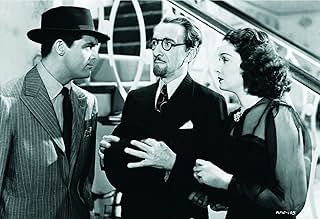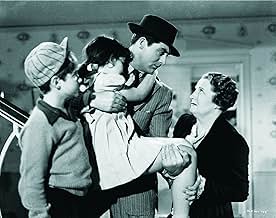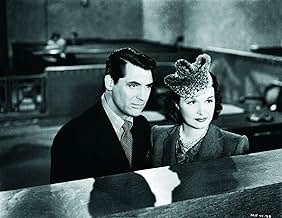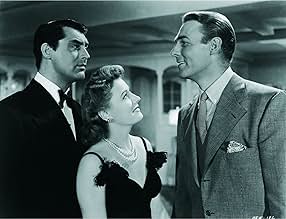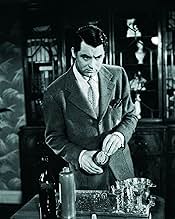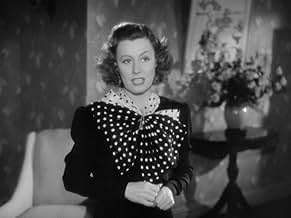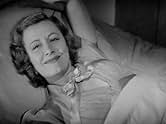IMDb-BEWERTUNG
7,2/10
12.196
IHRE BEWERTUNG
Eine Frau, die seit sieben Jahren vermisst und für tot gehalten wird, kehrt am Tag der zweiten Heirat ihres Mannes zurück nach Hause.Eine Frau, die seit sieben Jahren vermisst und für tot gehalten wird, kehrt am Tag der zweiten Heirat ihres Mannes zurück nach Hause.Eine Frau, die seit sieben Jahren vermisst und für tot gehalten wird, kehrt am Tag der zweiten Heirat ihres Mannes zurück nach Hause.
- Für 3 Oscars nominiert
- 3 Gewinne & 3 Nominierungen insgesamt
Jean Acker
- Postponed Case Witness
- (Nicht genannt)
Murray Alper
- Yosemite Bartender
- (Nicht genannt)
Leon Belasco
- Waiter - Pacific Club Poolside
- (Nicht genannt)
Joe Cabrillas
- Phillip
- (Nicht genannt)
Bill Cartledge
- Page Boy Paging Burkett
- (Nicht genannt)
Chester Clute
- Shoe Salesman
- (Nicht genannt)
Corky
- Corky the Dog
- (Nicht genannt)
Empfohlene Bewertungen
...albeit a little slow-paced in the first half. Leo McCarey's chaotic pace which made The Awful Truth so much fun is missed here, but Garson Kanin directs capably in his absence and the script and actors deliver enough good wit and chemistry to keep it all balanced out in the end.
Cary Grant gets himself into an unwitting romantic pickle when he's confronted by his thought to be long dead wife on his honeymoon with his new bride. Hilarity ensues, as it does in every brilliant screwball comedy Grant was the star of, and there are some priceless moments along the way.
As in The Awful Truth, Grant and Irene Dunne make a fetching and compatible screen couple. Dunne's comedic felinity and tendency to affect nutty stereotypes in order to get what she wants is better than Katharine Hepburn's imitation of her in Bringing Up Baby and The Philadelphia Story. Grant and Hepburn were terrific in their movies together too, and not taking anything away from Great Kate, but Grant and Dunne's chemistry was just that much better and it's a shame they never made more comedies together.
Hilarious in-jokey scenes between Grant and Randolph Scott, and a near scene stealing turn by Granville Bates as The Judge round out a pretty funny flick.
The Doris Day/James Garner remake "Move Over, Darling" is memorable in its own right and viewed right after this would make for a good video double-bill.
Cary Grant gets himself into an unwitting romantic pickle when he's confronted by his thought to be long dead wife on his honeymoon with his new bride. Hilarity ensues, as it does in every brilliant screwball comedy Grant was the star of, and there are some priceless moments along the way.
As in The Awful Truth, Grant and Irene Dunne make a fetching and compatible screen couple. Dunne's comedic felinity and tendency to affect nutty stereotypes in order to get what she wants is better than Katharine Hepburn's imitation of her in Bringing Up Baby and The Philadelphia Story. Grant and Hepburn were terrific in their movies together too, and not taking anything away from Great Kate, but Grant and Dunne's chemistry was just that much better and it's a shame they never made more comedies together.
Hilarious in-jokey scenes between Grant and Randolph Scott, and a near scene stealing turn by Granville Bates as The Judge round out a pretty funny flick.
The Doris Day/James Garner remake "Move Over, Darling" is memorable in its own right and viewed right after this would make for a good video double-bill.
There are some lovely, touching and dryly amusing scenes in this film. Kanin and the scriptwriters manage to form a substantive, if occasionally gossamer light, whole out of the playing of fine leads and canny comic incidents. The basic story may be the oldest of chestnuts, but it is here embellished with some degree of incisiveness. Grant's scene by the pool with Dunne and Scott reaches a fine pitch of hilarity, and who can forget the impressionistic scene of Scott's diving coming into Grant's mind and being presented in miniature on-screen?
That master player of light, witty material, Grant, is of course sublime, and I was surprised by Irene Dunne - who I had never previously seen in a lead film role. She was magnificently feline, as Pauline Kael says; dispensing slinky, fluttering phrases and quips, and making it clear what a laugh the character is having; she seems rather to be getting off on the entangled situation. The speech patterns are drolly created by Dunne; wonderful Southern hamming, or archetypal screwball dame quick-talk... Her warming, gadding-about voice is charms, along with deft facial acting; look at the "Oh Bianca..." scene at the hotel early on, where she sensuously reclines on a settee and gets Grant to pretend he is entering the room and kissing his new wife. Minxish mischief of the most heartwarming kind, aye...!
Remarkable to think that Ms. Dunne was over forty when this was made. She has the bearing of many years younger and conveys an impressive vigour. One takes to her unconventional good looks; her slight awkwardness as a 'star' is amusingly alluded to, under the surface, in her son's dialogue late on; very poignant little moment, that. Like Rosalind Russell and Kate Hepburn, she is no textbook beauty, and it is her characterful playing conveys a winking, winning attractiveness. Why is it that we have so few similarly idiosyncratic actresses around today? All - or rather much - has to be homogenised; pop star product looks are apparently required, and conveyor-belted into mainstream films. Film is missing the enticing depths of real-life when it opts for the conformist teenage boy's supposed 'dream woman' - mass-media-fostered - over a greater variety of people and appearances, as one encounters in actual reality.
The actor playing the world-weary, rather Robb Wilton-esquire magistrate ought to have been involved more than he was; an enjoyable turn, that would have been effectively woven deeper into the narrative. Randolph Scott amused slightly too, in his support role; a worthy foil. Things did perhaps get rather sentimental with the involvement of the couple's children, although this is hardly the worst such offender in Hollywood history. The insidious wryness seems completely blunted by the end, when the couple are finally reconciled. One may be charmed by the actors' performances, but it all starts to seem a bit indulgent, and the feeling grows that chances were missed.
But really, one must be indulgent, critically; there is priceless stuff in this film's fibre, and while it fires not on all screwball-comedy cylinders, it is a very pleasant feature with glorious screen presences making (deceptively) light of life.
That master player of light, witty material, Grant, is of course sublime, and I was surprised by Irene Dunne - who I had never previously seen in a lead film role. She was magnificently feline, as Pauline Kael says; dispensing slinky, fluttering phrases and quips, and making it clear what a laugh the character is having; she seems rather to be getting off on the entangled situation. The speech patterns are drolly created by Dunne; wonderful Southern hamming, or archetypal screwball dame quick-talk... Her warming, gadding-about voice is charms, along with deft facial acting; look at the "Oh Bianca..." scene at the hotel early on, where she sensuously reclines on a settee and gets Grant to pretend he is entering the room and kissing his new wife. Minxish mischief of the most heartwarming kind, aye...!
Remarkable to think that Ms. Dunne was over forty when this was made. She has the bearing of many years younger and conveys an impressive vigour. One takes to her unconventional good looks; her slight awkwardness as a 'star' is amusingly alluded to, under the surface, in her son's dialogue late on; very poignant little moment, that. Like Rosalind Russell and Kate Hepburn, she is no textbook beauty, and it is her characterful playing conveys a winking, winning attractiveness. Why is it that we have so few similarly idiosyncratic actresses around today? All - or rather much - has to be homogenised; pop star product looks are apparently required, and conveyor-belted into mainstream films. Film is missing the enticing depths of real-life when it opts for the conformist teenage boy's supposed 'dream woman' - mass-media-fostered - over a greater variety of people and appearances, as one encounters in actual reality.
The actor playing the world-weary, rather Robb Wilton-esquire magistrate ought to have been involved more than he was; an enjoyable turn, that would have been effectively woven deeper into the narrative. Randolph Scott amused slightly too, in his support role; a worthy foil. Things did perhaps get rather sentimental with the involvement of the couple's children, although this is hardly the worst such offender in Hollywood history. The insidious wryness seems completely blunted by the end, when the couple are finally reconciled. One may be charmed by the actors' performances, but it all starts to seem a bit indulgent, and the feeling grows that chances were missed.
But really, one must be indulgent, critically; there is priceless stuff in this film's fibre, and while it fires not on all screwball-comedy cylinders, it is a very pleasant feature with glorious screen presences making (deceptively) light of life.
This gets pretty good comic mileage out of the often-used 'Enoch Arden' (or, as here, 'Ellen Arden') idea of the long-lost spouse who returns to find his/her spouse now involved with someone else. Numerous movies have used it both for drama and for comedy, and in this case, the premise is adapted to the screwball comedy formula that was so popular for a time in the 1930s and 1940s.
The story starts by slightly revising the usual setup, with Irene Dunne as the formerly shipwrecked spouse, Cary Grant as the husband who has since become involved with another woman (Gail Patrick), plus Randolph Scott as a wild card in the relationships. Practically every stage of the story is highly implausible (probably deliberately so) but amusing, and it is generally left to the cast to make things work, which they usually do.
Grant usually seems quite at home in this kind of comedy, and he and Dunne work well together, depicting their characters' relationship with the kinds of intangibles that help make the whole scenario more believable. Patrick is always quite good as an elegantly icy rival to the heroine, and Scott also works well here in his role. Amongst the supporting cast, Granville Bates gets some very good moments as the grouchy judge.
For as far-fetched as the scenario seems at times, it works pretty well. The cast is strong enough to carry the weight, and it would have been hard to improve upon their combination of talents. It doesn't have quite the depth of comic variety or the subtlety of implied commentary that the best screwball comedies have, but it's an entertaining movie worth seeing.
The story starts by slightly revising the usual setup, with Irene Dunne as the formerly shipwrecked spouse, Cary Grant as the husband who has since become involved with another woman (Gail Patrick), plus Randolph Scott as a wild card in the relationships. Practically every stage of the story is highly implausible (probably deliberately so) but amusing, and it is generally left to the cast to make things work, which they usually do.
Grant usually seems quite at home in this kind of comedy, and he and Dunne work well together, depicting their characters' relationship with the kinds of intangibles that help make the whole scenario more believable. Patrick is always quite good as an elegantly icy rival to the heroine, and Scott also works well here in his role. Amongst the supporting cast, Granville Bates gets some very good moments as the grouchy judge.
For as far-fetched as the scenario seems at times, it works pretty well. The cast is strong enough to carry the weight, and it would have been hard to improve upon their combination of talents. It doesn't have quite the depth of comic variety or the subtlety of implied commentary that the best screwball comedies have, but it's an entertaining movie worth seeing.
After his shipwrecked wife is declared dead and he takes on a new wife, Grant's first wife resurfaces, rescued after seven years on an island. This reteaming of Grant and Dunne after their success with "The Awful Truth" is pretty funny for the most part, as Grant tries to solve the problem of one wife too many while dealing with jealousy after learning that Dunne had a male companion (Scott) on that island. The only complaint is that the laughs stop in the last quarter of the movie, which is rather uninteresting as the focus shifts from comedy to romance. Bates, who is hilarious as a flustered judge, died in July 1940 but managed to act in 12 films released that year!
A curious one that leaves a mildly bitter taste in the mouth. It's funny alright (but never hilarious), and the acting from - and chemistry between - Irene Dunne and Cary Crant is exquisite as always. But the film's fundamental problem is that none of the characters are particularly likable. Throughout the film three of the four main characters take their turn to behave despicably, yet the new wife - a woman who's merely unpleasant - is the villain of the piece; constantly the butt of jokes and fair game for ridicule even though she's done absolutely nothing to warrant it. At times it's like watching two spoilt brats from the Hamptons bullying their visiting second-cousin from the Bronx.
The script is also strangely stunted, best witnessed in the scenes before the judge. They really should have been classic screwball moments - the ingredients were there - yet between the lengthy silences and repetitive parrot-dialogue it falls almost completely flat. The gaping plot holes and poor script continuity can't be forgiven either, even allowing for the fact the film's seventy years old.
Don't get me wrong, I laughed, and I enjoyed myself, and I thought it was a decent film. It's just that the character's actions don't stand up too well under scrutiny.
The script is also strangely stunted, best witnessed in the scenes before the judge. They really should have been classic screwball moments - the ingredients were there - yet between the lengthy silences and repetitive parrot-dialogue it falls almost completely flat. The gaping plot holes and poor script continuity can't be forgiven either, even allowing for the fact the film's seventy years old.
Don't get me wrong, I laughed, and I enjoyed myself, and I thought it was a decent film. It's just that the character's actions don't stand up too well under scrutiny.
Wusstest du schon
- WissenswertesCary Grant and Randolph Scott, who play rivals in this film, lived together on and off between 1932 and 1944.
- PatzerWhen Ellen has her first hot shower in seven years, she wears a bathing cap rather than washing her hair in the shower.
- Zitate
Nick Arden: I came here with my wife... hum... my bride really. Now my wife, not my bride... my wife... Why should I bore you with details?
Hotel clerk: I won't be bored.
Nick Arden: Listen, it's just simple as A B C.
Hotel clerk: Don't tell me you got someone in B?
- Crazy CreditsRather than the normal "The End" title as the movie concludes, "Good Night" is drawn in cursive handwriting.
- VerbindungenEdited into Marilyn: Ihr letzter Film (1990)
- SoundtracksJingle Bells
(1857) (uncredited)
Written by James Pierpont
Played as part of the score when Cary Grant dons his Santa Claus costume
Top-Auswahl
Melde dich zum Bewerten an und greife auf die Watchlist für personalisierte Empfehlungen zu.
Everything New on HBO Max in August
Everything New on HBO Max in August
Looking for something different to add to your Watchlist? Take a peek at what movies and TV shows are coming to HBO Max this month.
- How long is My Favorite Wife?Powered by Alexa
Details
- Laufzeit1 Stunde 28 Minuten
- Farbe
- Seitenverhältnis
- 1.37 : 1
Zu dieser Seite beitragen
Bearbeitung vorschlagen oder fehlenden Inhalt hinzufügen


